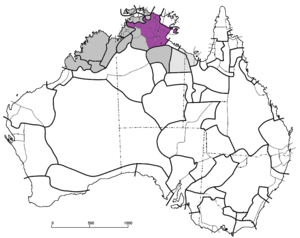Macro-Gunwinyguan languages
| Macro-Gunwinyguan | |||
|---|---|---|---|
| Arnhem | |||
| Geographic distribution | northern Australia | ||
| Linguistic classification |
| ||
| Subdivisions |
| ||
| Glottolog |
gunw1250 (Gunwinyguan)[1] mani1293 (Maningrida)[2] mang1423 (Mangarrayi–Marran)[3] kung1259 (Kungarakany)[4] gaga1251 (Gagudju)[5] | ||
|
The Arnhem languages (purple), and other non-Pama–Nyungan languages (grey). Below (closeup): the individual families. | |||
|
| |||
The Macro-Gunwinyguan languages, also called Arnhem or Gunwinyguan, are a family of Australian Aboriginal languages spoken across eastern Arnhem Land in northern Australia. Their relationship has been demonstrated through shared morphology in their verbal inflections.
Many of the languages have a fortis–lenis contrast in plosive consonants. Lenis/short plosives have weak contact and intermittent voicing, while fortis/long plosives have full closure, a more powerful release burst, and no voicing.
Languages
Rebecca Green (2004) reconstructed the paradigms of 28 Proto-Arnhem verbs.[6] The languages included by Green are as follows, though Green only accepts Manningrida as a demonstrated branch:[7]
- Maningrida (see)
- ? East Arnhem: Wubuy (Nunggubuyu), Ngandi, Anindilyakwa (Enindhilyagwa)*
- ? Marran: Marra, Warndarrang, ?Yugul*
- ?Alawa*
- ?Mangarrayi
- Kungarakany
- Gagudju
- ? Gunwinyguan (Gunwinyguan proper)
- Gunwinggic: Kunwinjku (Gunwinggu, Bininj Gun-wok), Kunbarlang
- Jawoyn (Djauan)
- Dalabon (Ngalkbun)
- Jala (Rembarngic): Rembarrnga, Ngalakgan
- Warrayic: Waray, Uwinymil
This is close to what Evans (1997) proposed under the name Gunwinyguan (cf. his very different proposal of Arnhem Land languages.)
Marra, Warndarrang, Alawa, and Mangarrayi have been argued to constitute a Marran family of considerable time depth (Sharpe 2008).[8][9]
Heath (1990)[10] demonstrated an East Arnhem family of Ngandi + Nunggubuyu; Enindhilyagwa was added later.
However, Green (2003) argues that only Maningrida has been established as a valid subgroup, and that the interrelationships of the other languages are as yet unclear. The evidence for Gunwinyguan and perhaps other nodes listed above may simply be reflections of a relationship of all Arnhem languages when only a subset of them was investigated. That is, these groups may be based on shared retentions of Proto-Arnhem rather than distinct historical developments. (However, in reviewing Green, Evans pointed out that much of the Maningrida morphology was also shared by Mangarrayi.[7]) An agnostic view of the family would list each language separately, except for the established Maningrida branch:
- Kungarakany, Mangarrayi, Marra, Maningrida, Ngalakgan, Bininj Gun-wok (Gunwinggu), Warndarrang, Uwinymil, Gaagudju, Dalabon, Kunbarlang, Rembarrnga, Nunggubuyu, Jawoyn, Warray, Ngandi
*Green does not address Anindilyakwa, Alawa, or Yugul. Yugul is too poorly attested for comparison based on her methods; the other two await validation.
Yangmanic had once been included in Gunwinyguan, but has been removed from recent classifications.
External classification
Evans (1997) proposes that these languages are related to Pama–Nyungan in a family he calls Macro-Pama–Nyungan, but this has not (yet) been demonstrated.[11]
In 2003, he proposed that they are (also) related to the Eastern Daly languages.[12]
References
- ↑ Hammarström, Harald; Forkel, Robert; Haspelmath, Martin; Bank, Sebastian, eds. (2016). "Gunwinyguan". Glottolog 2.7. Jena: Max Planck Institute for the Science of Human History.
- ↑ Hammarström, Harald; Forkel, Robert; Haspelmath, Martin; Bank, Sebastian, eds. (2016). "Maningrida". Glottolog 2.7. Jena: Max Planck Institute for the Science of Human History.
- ↑ Hammarström, Harald; Forkel, Robert; Haspelmath, Martin; Bank, Sebastian, eds. (2016). "Mangarrayi–Marran". Glottolog 2.7. Jena: Max Planck Institute for the Science of Human History.
- ↑ Hammarström, Harald; Forkel, Robert; Haspelmath, Martin; Bank, Sebastian, eds. (2016). "Kungarakany". Glottolog 2.7. Jena: Max Planck Institute for the Science of Human History.
- ↑ Hammarström, Harald; Forkel, Robert; Haspelmath, Martin; Bank, Sebastian, eds. (2016). "Gagudju". Glottolog 2.7. Jena: Max Planck Institute for the Science of Human History.
- ↑ Bowern, Claire and Harold Koch, 2004. Australian Languages: Classification and the Comparative Method, p 44
- 1 2 Rebecca Green, 2003. "Proto-Maningrida within Proto-Arnhem: evidence from verbal inflectional suffixes." In Nicholas Evans, ed. The Non-Pama-Nyungan languages of northern Australia.
- ↑ Sharpe, Margaret, 2008, Alawa
- ↑ Alawa at the Australian Indigenous Languages Database, Australian Institute of Aboriginal and Torres Strait Islander Studies
- ↑ Heath, Jeffrey, 1990, A case of intensive lexical diffusion: Arnhem Land, Australia
- ↑ McConvell, Patrick and Nicholas Evans. (eds.) 1997. Archaeology and Linguistics: Global Perspectives on Ancient Australia. Melbourne: Oxford University Press
- ↑ Evans, Nicholas, 2003, The non-Pama-Nyungan languages of northern Australia

.png)